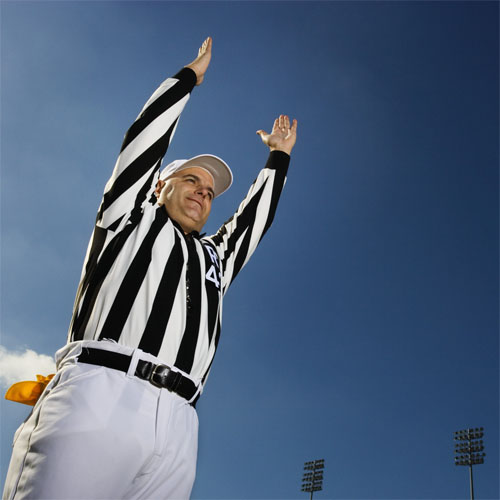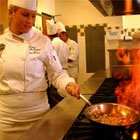
Zebra
Somewhere in, NJ
Male, 62
I've officiated football for over 30 years, now in my 26th on the college level. I've worked NCAA playoffs at the Division II and III level. In addition, I've coached at the scholastic level and have been an educator for over 35 years. I have no interest whatsoever in being an NFL official! Ever!
Yes and yes. A PAT is a scrimmage play and, as with any play from scrimmage, you can call any play you want. A PAT is a scrimmage kick and, as on a punt (another scrimmage kick) you can change your mind after s penalty.
I will definitively say, maybe. If the lineman maintains contact with the rusher and the opponent ends up facing away from the blocker, then no. It's continuous action and the original contact - that was legal - is continuing. However, if the defender gets past him and contact is lost, and then the O lineman pushes him in the back, then yes it can be IBB.
First, in the NFL, outside of two minutes remaining in each half, the clock is started once the ball is spotted after the runner goes out of bounds. And the clock is stopped when a runner goes OOB. Now, in your situation, the only thing I can think of is that Brown had forward progress and then was pushed OOB. In that case, he technically didn't go out of bounds. Rather, he was stopped while in bounds and that ended the play. Not the going OOB.
Placed at the one in the NFL, at the 2 in NCAA play. If there was a false start, then there was no play. Yes, the five-yard penalty is enforced and then the offense runs the untimed down from the 6 or 7, depending on the level. In high school, it is simply a 15 yard penalty from the previos spot.
iPhone & iPad Technician
 Is Apple is still the young and hip brand or have mom and dad spoiled it?
Is Apple is still the young and hip brand or have mom and dad spoiled it?
Chef
 Is it true that the "specials" are usually the stuff that's been sitting around awhile?
Is it true that the "specials" are usually the stuff that's been sitting around awhile?
Fashion Forecaster
 Are people in the fashion world as rotten as those in Devil Wears Prada?
Are people in the fashion world as rotten as those in Devil Wears Prada?
Hey, coach! Tell your player to either catch it in the field of play or in the endzone. No indecision!!
Generally, officials will give the player the benefit of the doubt and say he's in the endzone. But if he is obviously straddling the line as you describe, he's caused all of us problems. It matters where the ball is, not the player. But if he throws it, he just screwed the pooch. If he throws it backwards, it's alive and the kicking team could recover it. If he throws it out of bounds backwards, it's a safety. If he throws it forward from the endzone, it's an illegal forward pass and the penalty is marked from the spot of the foul -- safety.
Yes. The axiom is "a kick is a kick is a kick". If K touches the ball, it is "illegal" or "first" touching, depending on the level (HS, NCAA). But the ball as you describe it is still considered a kick, so being downed in the endzone makes it a touchback.
Yo? Really?
No. What you describe is a foul. Intentionally kicking a ball - not a scrimmage kick - is a foul.
-OR-
 Login with Facebook
Login with Facebook (max 20 characters - letters, numbers, and underscores only. Note that your username is private, and you have the option to choose an alias when asking questions or hosting a Q&A.)
(A valid e-mail address is required. Your e-mail will not be shared with anyone.)
(min 5 characters)
By checking this box, you acknowledge that you have read and agree to Jobstr.com’s Terms and Privacy Policy.
-OR-
 Register with Facebook
Register with Facebook(Don't worry: you'll be able to choose an alias when asking questions or hosting a Q&A.)